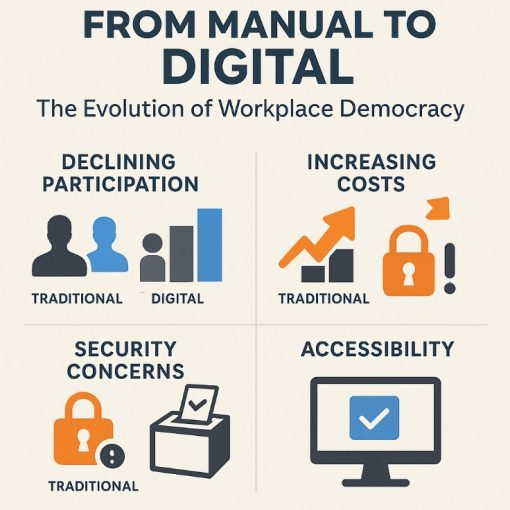In an era where technology permeates every facet of our lives, from communication to commerce, the evolution of democratic processes through online voting is a significant leap forward. Online voting, or e-voting, is transforming how citizens participate in elections, offering a modern alternative to traditional manual voting systems. This article explores the importance and myriad benefits of adopting online voting over offline methods.
Enhanced Accessibility for Voters
One of the most compelling advantages of online voting is universal accessibility. Voters can cast their ballots from anywhere in the world, provided they have internet access. This is particularly beneficial for:
- Expats and Overseas Citizens: Individuals living abroad can participate without the need to return to their home country or rely on postal services.
- People with Disabilities: Online platforms can be designed to be accessible for those with physical limitations, ensuring inclusivity.
- Remote Communities: Residents in distant or rural areas no longer need to travel long distances to reach polling stations.
Increased Voter Participation
By lowering barriers to vote, online systems can lead to higher voter turnout. Convenience plays a crucial role in encouraging participation among:
- Busy Professionals: Those with tight schedules can vote without disrupting their work commitments.
- Younger Voters: Tech-savvy generations are more inclined to engage through digital platforms.
Improved Efficiency and Cost-Effectiveness
Transitioning to online voting can result in significant cost savings and efficiency gains:
- Reduced Operational Costs: Savings on printing ballots, staffing polling stations, and logistics.
- Faster Results: Automated vote counting accelerates the tallying process, providing quicker election outcomes.
Enhanced Security Measures
Modern online voting systems incorporate robust cybersecurity protocols to protect the integrity of elections:
- Encryption Technologies: Safeguard data transmission to prevent interception and tampering.
- Authentication Processes: Multi-factor authentication ensures that each vote is legitimate.
- Audit Trails: Digital records allow for transparent verification of results.
Environmental Sustainability
Online voting supports eco-friendly initiatives by reducing the environmental impact associated with traditional voting:
- Less Paper Waste: Eliminates the need for paper ballots and related materials.
- Reduced Carbon Footprint: Minimizes travel emissions as voters no longer need to commute to polling stations.
Flexibility and Convenience
E-voting offers unparalleled convenience:
- Extended Voting Periods: Elections can remain open longer without the logistical challenges of staffing.
- User-Friendly Interfaces: Intuitive platforms make the voting process straightforward for all age groups.
Strengthened Democratic Processes
By making voting more accessible and secure, online systems strengthen the overall democratic framework:
- Greater Representation: Higher participation rates lead to election results that more accurately reflect the will of the people.
- Transparency: Digital records enhance trust in the electoral process through verifiable and tamper-proof data.
Overcoming Challenges
While the benefits are substantial, it’s important to address challenges such as:
- Digital Divide: Ensuring equal access for individuals without reliable internet connectivity.
- Cybersecurity Threats: Constantly updating security measures to combat evolving cyber threats.
- Regulatory Compliance: Adhering to legal standards and protecting voter privacy.
Conclusion
The shift towards online voting is a natural progression in our increasingly digital world. By embracing this change, societies can enhance democratic participation, improve efficiency, and ensure that the electoral process is secure and accessible to all. As technology continues to advance, online voting stands as a pivotal development in empowering citizens and strengthening democracy.


